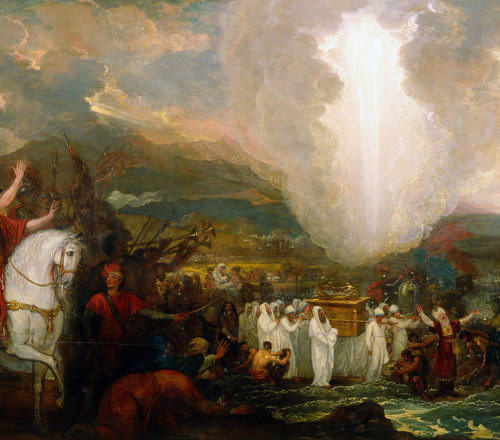Yoel ben Shlomo – Light of the Prophets – 1 Samuel 13:1-14

Why is Israel’s first king from the tribe of Benjamin and not from Judah? How long was Saul actually king for? What is the “appointed days” and “commandment of God” in 1 Samuel 13:13?
Truth2U Radio is hosted, edited, and produced by Jono Vandor and all programs are made freely available to download. If these programs have been a blessing to you please consider showing your support by contributing a donation or partnering with Truth2U on a monthly basis. Thank you for listening!

[audio:https://truth2u.org/wp-content/uploads/2013/01/Truth2U-Yoel-1-Samuel-13.mp3|titles=Truth2U – Yoel – 1 Samuel 13]






on my bible genealogy spread sheet I put together, It happens that the 53rd Jubilee is the the year of Exodus – 1334 BC….
450 years exactly later is the 62nd Jubilee (884 BC) and the time of Samuels birth it seems… I cant be sure that this is his birth but if it is he is exactly 30 years old at Eli’s death of 98 years – 854 BC…
At the 63rd Jubilee – 834 BC, I have David beginning his reign as King over Israel and then Judah at 30 years old…
Dont know if that sheds some light on things concerning the Benjamite King issue but it is an interesting thing…
Shalom,
Could the reason Benyamin (Shaul) was first “king” was because it should follow the pattern laid out in Torah? Was Benyamin himself (the other son of the barren wife) set as “king” by Yaqov in Yoseph’s absence?
I fully agree that the tribe of Yehudah was the “leading tribe, strongest tribe” (Jud 1:19) when they went into the land, but that is as a tribe, a group. Whereas, the individual head who lead them into the land was Yehoshua ben Nun (Jos 6:27). The rightful head would still be Yoseph (Ge 39:2 & 21) if following the pattern of Torah, with Benaymin (Shaul) as interrim.
Check the first 4 words of those verses in the Hebrew. They are a string unlike any other in Torah and the Prophets.
Is it not more likely that Ge 49:10, the shevet (the “scepter) of Yehudah has to do with how they were the most loyal “tribe”, and are responsible for the preservation of the Hebrew Torah (lawgiver between his free)? Of this, we must be most grateful.
Wouldn’t part of that loyalty predispose Yehudah to aceept the rightful head when Dawid the Ephraty (Ephramite) was anointed king? The house of Dawid may very well be Ephraty, Epharmite.
Psalm 68:27 has an interesting take on Binyamin, the smallest, being their ruler… but then, this psalm would have been written decades after Shaul was king. Is a Binyaminite to be king (ruler) again? I don’t think this is a reference to the current Prime Minister 🙂
Yes, the psalm you refer to is interesting, James. Psalms are songs, and even today we see songs written about past events. The psalmist would have known the patterns of history, and also been adept at projecting the patterns into the future.
Some might say that Saul/Paul, the Benyamite of the New Testament fits the bill today, Heck, a long time ago Yoseph himself used Benyamin as a pawn to test his brothers loyalty to Yaqov(F/father). Might it also be said that Shaul and Paul are also being used to test the peoples loyalty to YHWH our Creator? Who can say for sure?
Genesis 49:27 Benjamin! a wolf teareth; In the morning he eateth prey, And at evening he apportioneth spoil.’
Oh, i would also like to mention that the reference to Yehudah above is Judges 1:19, not Jude as the popup bubble shows. I also probably should have mentioned the Aphraty (Ephramite) born of the barren mother, the great prophet Shmuel, the Yoseph figure whom YHWH tells to anoint Benyamin (Shaul) which becomes a test of the peoples loyalty towards Father, ie, YHWH our God.
How about scripture in the N.T. – Matt, Mark and Luke, all agreed that Yeshua said, that the first shall be last and the Last shall be first.. Could this be a reference to the 12 sons of Jacob…? As we know the blessings that were given to the sons are a bit of a reflection of this scripture I think… or not..
Gday, was searching the net for Ancient Maps and came across a 1750’s map of Israel… On this map it has all the tribes shaded in their regions… Benjamin’s tribe is in the region above Judah where its southern city is Jerusalem and meets and borders with Judah… Is this the reason that Saul was chosen as the first King…? Was Benjamin responsible for the ancient city of Jerusalem…?
http://upload.wikimedia.org/wikipedia/commons/e/e8/1759_map_Holy_Land_and_12_Tribes.jpg
Well, better late than never, right? I just now got to hear this episode – thanks so much for tackling my question!
The points about “melekh” NOT being the term used in Judah’s blessing, and the motif of the choosing of the second, bring to mind that ‘Plan A’ was for Israel to NOT have a king like the nations in the first place. Perhaps that’s why the blessing doesn’t contain that word – they weren’t to have one, ideally. However, since they did ask for one, Saul could be chosen and there’s no violation of any command regarding the tribe of origin. He then becomes the example of “giving the people what they want” and of what happens when we do things our way. Whereas the second is again chosen by YHVH, demonstrating HIS way of doing things.
Thanks again for the discussion!